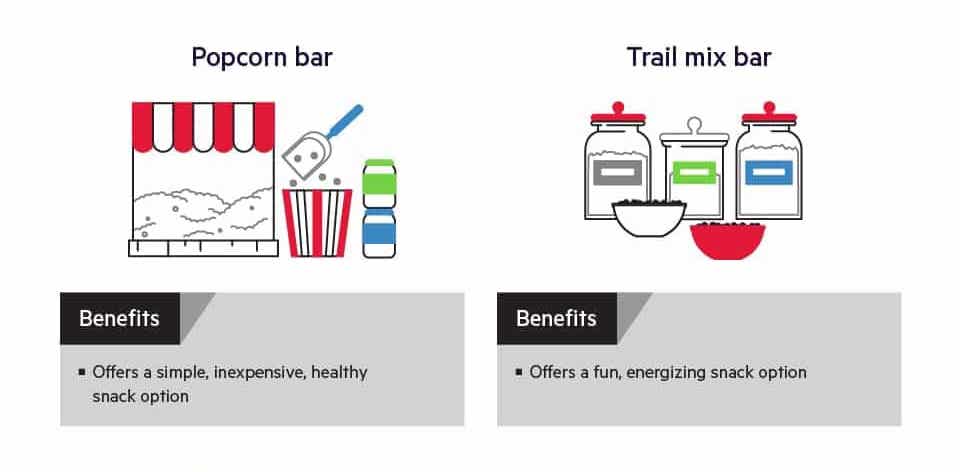Food is powerful: It’s not only the fuel that keeps us alive, it’s also a social glue. It has the power to bring people together, help them bond, and make them feel loved. Humans have gathered to share meals, stories, and laughter for at least 300,000 years.
Smart companies, such as Google and Facebook, are tapping into the power of food to encourage employees to be happier and more productive. Offering employees free food and drinks is a relatively inexpensive perk, but can help a company attract and keep top talent, encourage employees to collaborate better, and elevate a company’s culture.
Read on to learn what research suggests about the power and limitations of offering food perks to employees. Then discover some fun ways to treat your employees to food and beverages on any budget.

Happy Meals
We all love free food, but one group of workers respond especially well to this benefit. Millennials, who will make up 46 percent of the U.S. workforce by 2020, particularly appreciate snacks and other food perks at work. In one survey, about half of millennialssaid they could be lured to a new job by a company that offered better perks, including free snacks.
One thing’s clear: Food and drinks perks won’t mask an otherwise toxic work culture. Employees of all ages care about receiving a healthy compensation and benefits package, having career-advancement opportunities, receiving feedback about job performance, being heard, and having a healthy work-life balance. Food perks may even backfire if employees perceive them as a way to coax employees into skipping breaks or working exhausting hours. However, when a culture is otherwise positive and inclusive, free food can be a powerful way to elevate a company’s culture.
In one survey, 67 percent of employees who work in offices that provide complimentary food said they were very happy at work. That’s 12 percent higher than the percentage of all employees who said they were happy at work, according to the most recent BI Worldwide survey.
Happiness is a vague term, but research indicates employers should care about whether employees say they’re happy. Employee happiness is strongly correlated with engagement, a term used to describe the motivation of a company’s employees.
Companies with highly engaged employees get 100 percent more job applications and report 22 percent higher productivity. They also have lower employee turnover, and losing employees is costly. According to a study by the Center for American Progress, it costs a company 20 percent of a mid-range employee’s annual salary and more than 200 percent of an executive’s salary to replace him or her.

Pausing for Productivity
Food at work doesn’t just make employees happy; it may also make them more productive. Good nutrition is important for a worker’s job performance. Foods lower on the glycemic index, such as protein, vegetables, nuts, and whole grains, have been shown to help people be more productive for longer.
If it discourages employees from skipping breaks or scarfing down food in front of the computer, the power of catered office fare goes beyond nutrition. Sixty-two percent of professionals typically eat lunch at their desks, and 50 percent of workers usually eat alone. However, these practices are not ideal. Desktop dining doesn’t provide a change of scenery or a pause from work, and thus it often leads to fatigue and decreased productivity, according to research by Kimberly Elsbach at University of California, Davis.
Employer-provided meals encourage employees to get up from their desks, take breaks, hang out, and converse. It may sound counter intuitive, but these activities boost worker productivity.
The brain is not designed to focus for long periods. People feel more energetic, motivated, and able to concentrate after taking a break. Furthermore, workers who socialize over meals may actually be more efficient and productive on the job. Cornell economics professor Kevin Kniffin compared firefighters who shared meals to those who didn’t and found that the firefighters who dined together also cooperated better at work. When a Rhode Island call center aligned employees’ breaks to enable more chatting, productivity shot up and profits jumped about $15 million a year.
Shared meals may also fuel innovation. Google offers employees breakfast, lunch, and dinner options in various cafes and micro-kitchens, strategically located to encourage people in different departments to talk. Google hopes conversations spark ideas and lead to more collaboration.
However, there are a few caveats to offering free food at work. Breaks shouldn’t be an extension of work. If employees are forced to hang out with each other or talk about business during meals, they won’t get the recharging benefits of taking a break. They may even come back to work more fatigued.
Moreover, some employees may have disabilities, diets, or allergies that make sharing meals difficult. And rich or fattening office fare can make it hard for employees to stick to a healthy lifestyle or manage their weight. Some employees complain that free food has transformed the office into a landmine of temptations.
The best practice is to offer mostly healthy fare to those who want it and encourage employees to socialize with whomever they please during breaks.
Get Your Food On
Are you ready to offer your employees food as a perk? First, query employees about dietary restrictions and preferences, and accommodate them whenever possible. That way everyone can enjoy what you’re offering.
Try one of these ways to treat your employees:
- Catered meals
Want all of your employees to gather for regular meals or for a meeting or event? Offer a catered meal, and they will come. Having breakfast, lunch, or dinner delivered for your team, whether it’s every day, once a month, or on special occasions, is a sure way to make them feel appreciated. Moreover, a catered meal can make a mandatory meeting or a late day at the office far more appetizing. - Team cooking class
Looking for a way to treat your employees to a fun event that builds morale and teamwork? Host a team cooking class in or out of the office. They’ll have fun, learn more about each other, and feel appreciated. - Snack fridge
Chances are, your employees love snacks. Ninety four percent of Americans snack at least once a day, and 50 percent of Americans snack two or three times a day. However, many workers do not love being surrounded by tempting, less indulgent snacks such as bagels, chips, and cookies, which can lead to weight gain and make people feel sluggish. In one survey, employees preferred healthy snacks—bananas topped the list. Your team will likely thank you if you provide snack options such as fresh fruit, a trail mix or popcorn bar, or a stocked fridge with veggies, yogurt, and hard-boiled eggs. - Coffee station
If you’re looking to boost your employees’ health, happiness, and productivity, look no further than their coffee mugs. Most people love java, and mounting evidence suggests it’s a healthy beverage. Moreover, if you feel smarter after drinking a cup of joe, that may not be your imagination. Some studies indicate caffeine makes people more alert, focused, creative, and able to learn and recall facts. It also may have a mild antidepressant action. Outfit your team’s coffee station with a coffee grinder and some popular brewing devices, such as a drip coffeemaker, an espresso machine, a French press, and Melitta cones and filters. Stock a few different specialty roasts, including a decaffeinated option, as well as milk options for every diet. - Breakfast bar
It’s common wisdom that breakfast is the most important meal of the day. Whether or not breakfast reigns supreme, evidence suggests it’s important for health and performance. In one study, people who skipped breakfast more than three quarters of the time were 4.5 times more likely to be obese. Moreover, a healthy breakfast has been shown to help school children and middle-aged men be more productive. However, many of your employees probably go without the first meal of the day: Between 10 and 28 percent of people routinely skip it. Encourage your employees to fuel up before work by providing a healthy breakfast option, such as a cereal or yogurt bar stocked with fresh toppings. - Office happy hours
Want your employees to enjoy being at the office so much they stick around after work on a Friday evening to socialize? Offer specialty beer and wine tasting happy hours. Employees who relax and raise a glass together may enjoy a special sense of camaraderie. Be sure to include a seltzer selection for non-drinkers.







































